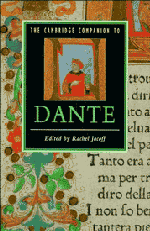Book contents
- Frontmatter
- 1 Life of Dante
- 2 Dante and the lyric past
- 3 Approaching the Vita nuova
- 4 The unfinished author
- 5 Dante and the empire
- 6 Dante and Florence
- 7 Dante and the classical poets
- 8 Dante and the Bible
- 9 The theology of Dante
- 10 A poetics of chaos and harmony
- 11 Introduction to Inferno
- 12 Introduction to Purgatorio
- 13 "Shadowy prefaces"
- 14 Dante and his commentators
- 15 Dante in English
- Further reading
- Index
4 - The unfinished author
Dante's rhetoric of authority in Convivio and De vulgari eloquentia
Published online by Cambridge University Press: 28 May 2006
- Frontmatter
- 1 Life of Dante
- 2 Dante and the lyric past
- 3 Approaching the Vita nuova
- 4 The unfinished author
- 5 Dante and the empire
- 6 Dante and Florence
- 7 Dante and the classical poets
- 8 Dante and the Bible
- 9 The theology of Dante
- 10 A poetics of chaos and harmony
- 11 Introduction to Inferno
- 12 Introduction to Purgatorio
- 13 "Shadowy prefaces"
- 14 Dante and his commentators
- 15 Dante in English
- Further reading
- Index
Summary
NO AUTHOR OF a literary work in the western tradition has solicited more critical attention and learned commentary than the Dante Alighieri of the Divina Commedia. And still the problem of explaining the very existence of this poem has remained beyond our reach. In fact, the remarkable critical and scholarly gains of recent years have only made our dilemma plainer. We have increasingly revealed the extraordinarily complex yet orderly structure of the Commedia; yet each advance in understanding of the scope and precise nature of Dante's achievement in a real sense only makes it that much more difficult to understand how such creativity came to be – what made a “Dante Alighieri” possible at that time and in that place (late medieval Europe; communal and feudal Italy; proto-capitalist Florence in the late 1200s and early 1300s).
Recent theoretical and methodological tendencies in the study of literature have taught us to be skeptical about trying to understand literary texts as the products of individual “genius.” They have urged us to see literature as a “system of discourse” – as a set of structural possibilities (and limitations) intrinsic to language in general and to the specific traditions of literary production in particular. They have pressed upon us the need to understand the social and political exigencies (ranging from constructive articulation of cultural “values” to the repressive enforcement of ideological codes) that call forth and determine the creations of individual authors. Finally, they have pushed us to recognize the psychologically “unconscious” forces that work parallel, and yet in opposition, to the conscious designs of the creative imagination of a poet.
- Type
- Chapter
- Information
- The Cambridge Companion to Dante , pp. 45 - 66Publisher: Cambridge University PressPrint publication year: 1993
- 2
- Cited by

